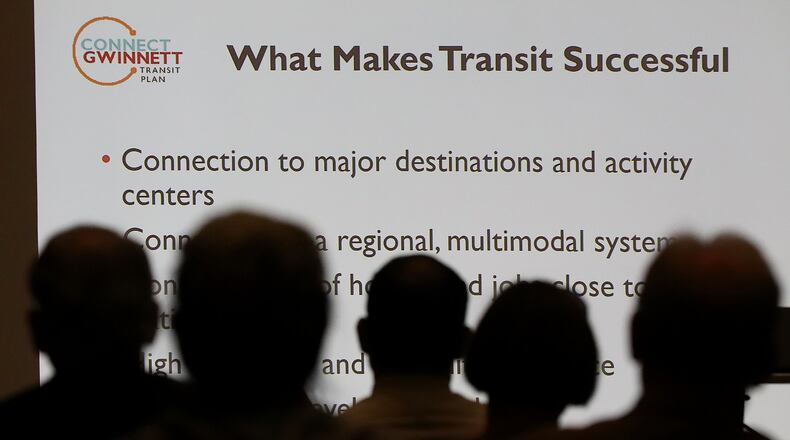Editor’s note: This article was originally published on Aug. 23, 2018.
The facts still stand. But you can also read up-to-date coverage of Gwinnett’s upcoming March 19 MARTA referendum at The AJC’s comprehensive voter’s guide.
In the days before the Gwinnett County Commission voted to call a public referendum on joining MARTA, Chairman Charlotte Nash made her feelings on the matter known.
She wanted the public to have a say on becoming part of the transit system, and she wanted to arrange a contract that would be palatable to both her fellow commissioners and to residents.
In a text message sent to a colleague, Nash relayed a conversation she’d had earlier with a woman wondering how she felt.
“She asked me if I wanted folks to vote for or against transit referendum,” Nash wrote in the message obtained by the The Atlanta Journal-Constitution through the Georgia Open Records Act. “I told her I wanted votes in favor, and that she would understand when she saw the good contract.”
The unique contract Nash helped negotiate with MARTA may have indeed helped convince her fellow commissioners to vote in favor of calling a referendum during that Aug. 1 commission meeting — and it could play an even more significant role in determining the success of Gwinnett's historic vote.
The contract gives Gwinnett an unprecedented amount of control over how its billions of projected tax dollars would be spent, potentially assuaging residents' distrust of "sending our money to Atlanta" — and of an agency with a reputation for financial mismanagement. Such a swing could be an especially important factor in a March transit vote that is the only item on the ballot, meaning low turnout is likely even for such a hot-button issue.
"I believe this contract, which was the product of long negotiations, establishes the structure for a long-term successful partnership between MARTA and Gwinnett County," MARTA board chairman Robbie Ashe said. Ashe and his colleagues are expected to vote on the contract during their September meeting, though it would become effective only if the referendum passes.
“It ensures that Gwinnett’s voters, through their county commission, will have substantial control over how their money is spent and how transit is delivered in their county for decades to come,” Ashe said.
Gwinnett's would-be contract with MARTA calls for a new penny sales tax that would be collected until July 1, 2057, the same date other metro jurisdictions' current transit taxes are set to expire. Like the agreement Clayton County and MARTA reached in 2014, it identifies an existing transit development plan as the blueprint for projects.
But Gwinnett’s agreement puts in place potential safeguards that Clayton’s and others don’t.
For one, it calls for returning transit tax money collected by the state directly to Gwinnett County, which can then make payments to MARTA as needed. In Clayton, tax collections are remitted directly to MARTA.
Money collected in Gwinnett must be used “for the benefit of Gwinnett,” the county’s contract says. That leaves some room for interpretation, and Gwinnett will also chip in money to help cover the overall system’s operations costs. But the language goes a step further than MARTA’s agreements with other jurisdictions.
The contract also includes a clause preventing MARTA from borrowing money for Gwinnett projects without approval from the county commission. All “fixed asset capital projects” will have to be approved by the county too.
Malcolm Getz, an emeritus professor of economics at Vanderbilt University, studied MARTA while he was a faculty member at Atlanta’s Spelman University. He called it rare, in general, that a suburban county opt to join an existing regional transit authority so many years after its founding.
That situation in and of itself helped set the stage for Gwinnett to have more control than is typical, and the timing also allowed it to build upon the contract established between Clayton County and MARTA. Getz raised questions about the need for heavy rail in a suburban county like Gwinnett, but said the arrangement could help Gwinnett taxpayers get more bang for their buck.
“Gwinnett’s proposed contract seeks to focus tax revenues raised in Gwinnett for services that are easily identified as valuable to Gwinnett,” Getz said. “Assuming that land and construction will be less expensive per mile in Gwinnett than in downtown Atlanta, the voters will hope to get more miles of transport than voters got in central Atlanta.”
Jeffrey Turner is the chairman of the Clayton County Commission and of the Atlanta Regional Commission’s regional transit committee. He agreed that Gwinnett worked a lot of sway into its potential contract — but said a county of its size joining the MARTA system would benefit the entire region.
“I’m glad to see that they’re asserting that effort and making sure their citizens are taken care of,” Turner said. “And, at the same time, I know that they recognize that it is a system that covers … four [other] jurisdictions.”
About the Author
Keep Reading
The Latest
Featured


